2018年重庆市高考英语试卷
2018年重庆市高考英语试卷【精选文档】
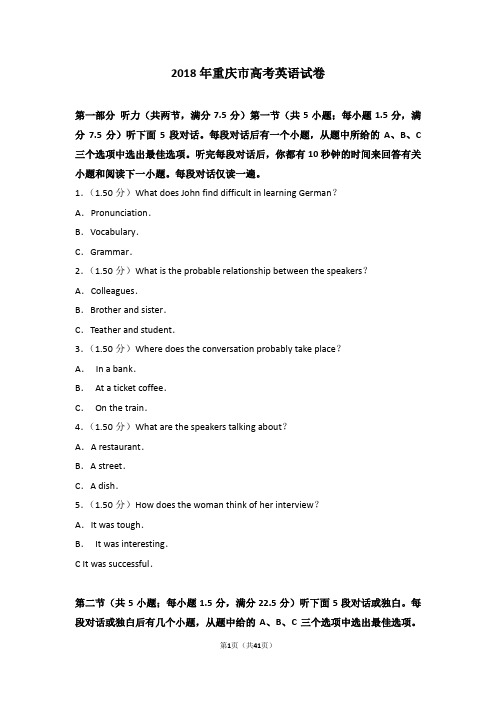
2018年重庆市高考英语试卷第一部分听力(共两节,满分7.5分)第一节(共5小题;每小题1.5分,满分7.5分)听下面5段对话。
每段对话后有一个小题,从题中所给的A、B、C 三个选项中选出最佳选项。
听完每段对话后,你都有10秒钟的时间来回答有关小题和阅读下一小题。
每段对话仅读一遍。
1.(1.50分)What does John find difficult in learning German?A.Pronunciation.B.Vocabulary.C.Grammar.2.(1.50分)What is the probable relationship between the speakers?A.Colleagues.B.Brother and sister.C.Teather and student.3.(1.50分)Where does the conversation probably take place?A.In a bank.B.At a ticket coffee.C.On the train.4.(1.50分)What are the speakers talking about?A.A restaurant.B.A street.C.A dish.5.(1.50分)How does the woman think of her interview?A.It was tough.B.It was interesting.C It was successful.第二节(共5小题;每小题1.5分,满分22.5分)听下面5段对话或独白。
每段对话或独白后有几个小题,从题中给的A、B、C三个选项中选出最佳选项。
听完每段对话或独白前,你将有时间阅读各个小题,每小题5秒钟;听完后,各小题将给出5秒钟的作答时间。
每段对话或独白读两遍。
6.(3.00分)听第6段材料,回答下列各题.(1)When will Judy go to a party?A.On Monday.B.On Tuesday.C.On Wednesday.(2)What will Max do next?A.Fly a kite.B.Read a magazine.C.Do his homework.7.(3.00分)听第7段材料,回答下列各题.(1)What does the man suggest doing at first?A.Going to a concert.B.Watching a movie.C.Playing a computer game.(2)What do the speakers decide to do?A.Visit Mike.B.Go boating.C.Talk a walk.8.(4.50分)听第8段材料,回答下列各题.(1)Which color do cats see better than humans?A.Red.B.Green.C.Blue.(2)Why do cats bring dead birds home?A.To eat them in a safe place.B.To show off their hunting skills.C.To make their owners happy.(3)How does the man sound at the end of the conversation?A.Grateful.B.Humorous.C.Curious.9.(6.00分)听第9段材料,回答下列各题.(1)Who is Macy?A.Ed's mother.B.Ed's teacher.C.Ed's friend.(2)How does Ed usually go to kindergarten?A.By car.B.On foot.C.By bus.(3)What does Ed enjoy doing at the kindergarten?A.Telling stories.B.Singing songs.C.Playing with others.(4)What do the teachers say about Ed?A.He's clever.B.He's quiet.C.He's brave.10.(6.00分)听第10段材料,回答下列各题.(1)At what age did Emily start learning ballet?A.Five.B.Six.C.Nine.(2)Why did Emily move to Toronto?A.To work for a dance school.B.To perform at a dance teacher.C.To learn contemporary dance.(3)Why did Emily quit dancing?A.She was too old to dance.B.She failed to get a scholarship.C.She lost interest in it.(4)How does Emily feel about stopping training?A.She's pleased.B.She's regretful.C.She's upset.第二部分阅读理解(共两节,满分30分)第一节(共4小题;每小题6分,满分30分)阅读下列短文,从每题所给的A、B、C和D四个选项中,选出最佳选项。
2018年重庆市高考英语试卷【新品】
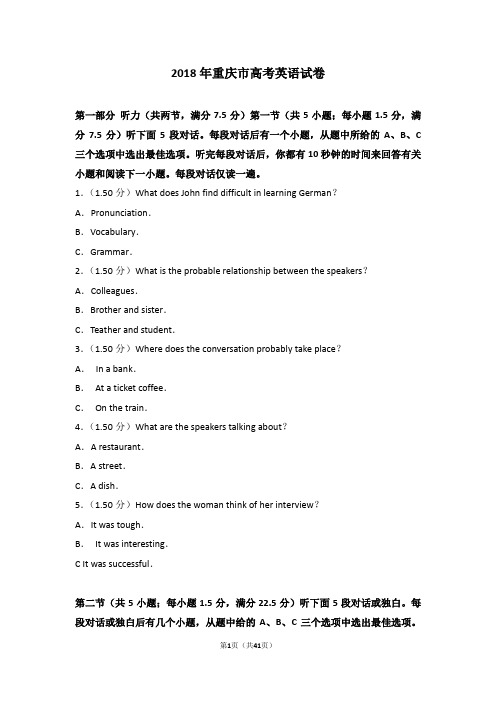
2018年重庆市高考英语试卷第一部分听力(共两节,满分7.5分)第一节(共5小题;每小题1.5分,满分7.5分)听下面5段对话。
每段对话后有一个小题,从题中所给的A、B、C 三个选项中选出最佳选项。
听完每段对话后,你都有10秒钟的时间来回答有关小题和阅读下一小题。
每段对话仅读一遍。
1.(1.50分)What does John find difficult in learning German?A.Pronunciation.B.Vocabulary.C.Grammar.2.(1.50分)What is the probable relationship between the speakers?A.Colleagues.B.Brother and sister.C.Teather and student.3.(1.50分)Where does the conversation probably take place?A.In a bank.B.At a ticket coffee.C.On the train.4.(1.50分)What are the speakers talking about?A.A restaurant.B.A street.C.A dish.5.(1.50分)How does the woman think of her interview?A.It was tough.B.It was interesting.C It was successful.第二节(共5小题;每小题1.5分,满分22.5分)听下面5段对话或独白。
每段对话或独白后有几个小题,从题中给的A、B、C三个选项中选出最佳选项。
听完每段对话或独白前,你将有时间阅读各个小题,每小题5秒钟;听完后,各小题将给出5秒钟的作答时间。
每段对话或独白读两遍。
6.(3.00分)听第6段材料,回答下列各题.(1)When will Judy go to a party?A.On Monday.B.On Tuesday.C.On Wednesday.(2)What will Max do next?A.Fly a kite.B.Read a magazine.C.Do his homework.7.(3.00分)听第7段材料,回答下列各题.(1)What does the man suggest doing at first?A.Going to a concert.B.Watching a movie.C.Playing a computer game.(2)What do the speakers decide to do?A.Visit Mike.B.Go boating.C.Talk a walk.8.(4.50分)听第8段材料,回答下列各题.(1)Which color do cats see better than humans?A.Red.B.Green.C.Blue.(2)Why do cats bring dead birds home?A.To eat them in a safe place.B.To show off their hunting skills.C.To make their owners happy.(3)How does the man sound at the end of the conversation?A.Grateful.B.Humorous.C.Curious.9.(6.00分)听第9段材料,回答下列各题.(1)Who is Macy?A.Ed's mother.B.Ed's teacher.C.Ed's friend.(2)How does Ed usually go to kindergarten?A.By car.B.On foot.C.By bus.(3)What does Ed enjoy doing at the kindergarten?A.Telling stories.B.Singing songs.C.Playing with others.(4)What do the teachers say about Ed?A.He's clever.B.He's quiet.C.He's brave.10.(6.00分)听第10段材料,回答下列各题.(1)At what age did Emily start learning ballet?A.Five.B.Six.C.Nine.(2)Why did Emily move to Toronto?A.To work for a dance school.B.To perform at a dance teacher.C.To learn contemporary dance.(3)Why did Emily quit dancing?A.She was too old to dance.B.She failed to get a scholarship.C.She lost interest in it.(4)How does Emily feel about stopping training?A.She's pleased.B.She's regretful.C.She's upset.第二部分阅读理解(共两节,满分30分)第一节(共4小题;每小题6分,满分30分)阅读下列短文,从每题所给的A、B、C和D四个选项中,选出最佳选项。
2018年重庆英语高考试题文档版(含答案)
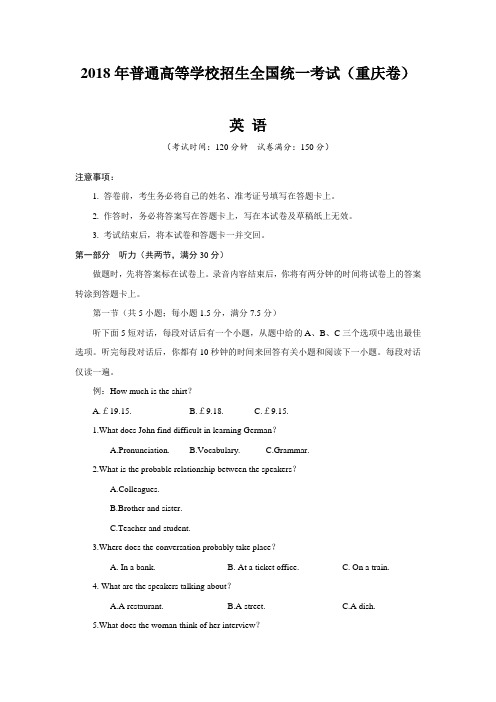
2018年普通高等学校招生全国统一考试(重庆卷)英语(考试时间:120分钟试卷满分:150分)注意事项:1. 答卷前,考生务必将自己的姓名、准考证号填写在答题卡上。
2. 作答时,务必将答案写在答题卡上,写在本试卷及草稿纸上无效。
3. 考试结束后,将本试卷和答题卡一并交回。
第一部分听力(共两节,满分30分)做题时,先将答案标在试卷上。
录音内容结束后,你将有两分钟的时间将试卷上的答案转涂到答题卡上。
第一节(共5小题;每小题1.5分,满分7.5分)听下面5短对话,每段对话后有一个小题,从题中给的A、B、C三个选项中选出最佳选项。
听完每段对话后,你都有10秒钟的时间来回答有关小题和阅读下一小题。
每段对话仅读一遍。
例:How much is the shirt?A.£19.15.B.£9.18.C.£9.15.1.What does John find difficult in learning German?A.Pronunciation.B.Vocabulary.C.Grammar.2.What is the probable relationship between the speakers?A.Colleagues.B.Brother and sister.C.Teacher and student.3.Where does the conversation probably take place?A. In a bank.B. At a ticket office.C. On a train.4. What are the speakers talking about?A.A restaurant.B.A street.C.A dish.5.What does the woman think of her interview?A.It was tough.B.It was interesting.C.It was successful. 第二节(共15小题;每小题1.5分,满分22.5分)听下面5段对话或独白,每段对话或独白后有几个小题,从题中所给的A、B、C三个选项中选出最佳选项。
重庆市2018年高考英语试题及答案(Word版)
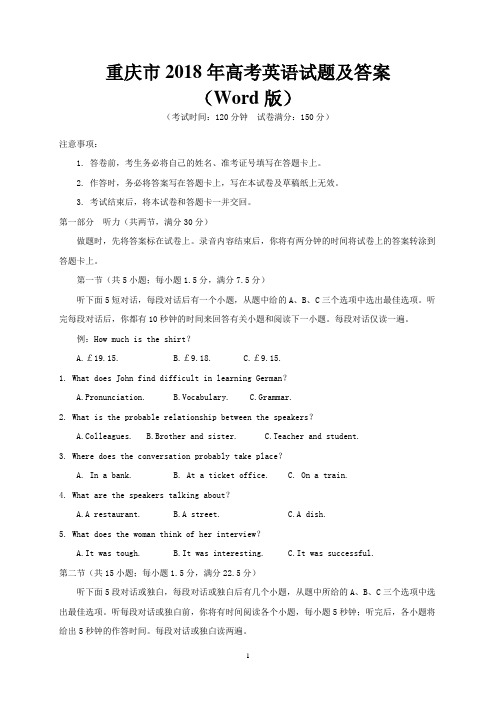
重庆市2018年高考英语试题及答案(Word版)(考试时间:120分钟试卷满分:150分)注意事项:1. 答卷前,考生务必将自己的姓名、准考证号填写在答题卡上。
2. 作答时,务必将答案写在答题卡上,写在本试卷及草稿纸上无效。
3. 考试结束后,将本试卷和答题卡一并交回。
第一部分听力(共两节,满分30分)做题时,先将答案标在试卷上。
录音内容结束后,你将有两分钟的时间将试卷上的答案转涂到答题卡上。
第一节(共5小题;每小题1.5分,满分7.5分)听下面5短对话,每段对话后有一个小题,从题中给的A、B、C三个选项中选出最佳选项。
听完每段对话后,你都有10秒钟的时间来回答有关小题和阅读下一小题。
每段对话仅读一遍。
例:How much is the shirt?A.£19.15.B.£9.18.C.£9.15.1. What does John find difficult in learning German?A.Pronunciation.B.Vocabulary.C.Grammar.2. What is the probable relationship between the speakers?A.Colleagues.B.Brother and sister.C.Teacher and student.3. Where does the conversation probably take place?A. In a bank.B. At a ticket office.C. On a train.4. What are the speakers talking about?A.A restaurant.B.A street.C.A dish.5. What does the woman think of her interview?A.It was tough.B.It was interesting.C.It was successful.第二节(共15小题;每小题1.5分,满分22.5分)听下面5段对话或独白,每段对话或独白后有几个小题,从题中所给的A、B、C三个选项中选出最佳选项。
2018年重庆市高考英语试卷-高考
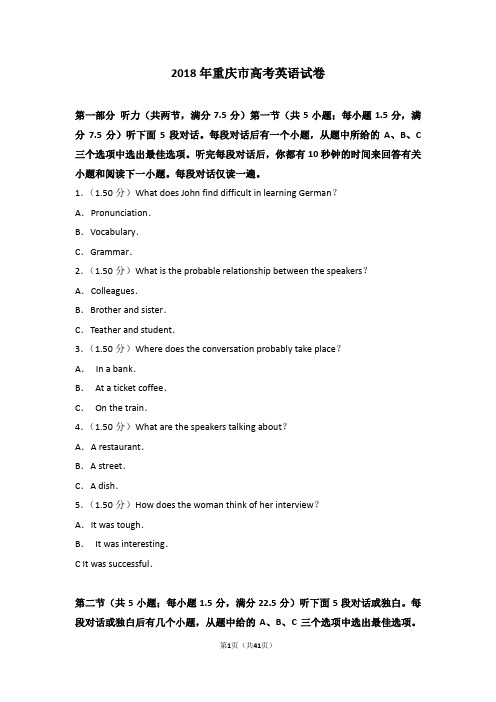
2018年重庆市高考英语试卷第一部分听力(共两节,满分7.5分)第一节(共5小题;每小题1.5分,满分7.5分)听下面5段对话。
每段对话后有一个小题,从题中所给的A、B、C 三个选项中选出最佳选项。
听完每段对话后,你都有10秒钟的时间来回答有关小题和阅读下一小题。
每段对话仅读一遍。
1.(1.50分)What does John find difficult in learning German?A.Pronunciation.B.Vocabulary.C.Grammar.2.(1.50分)What is the probable relationship between the speakers?A.Colleagues.B.Brother and sister.C.Teather and student.3.(1.50分)Where does the conversation probably take place?A.In a bank.B.At a ticket coffee.C.On the train.4.(1.50分)What are the speakers talking about?A.A restaurant.B.A street.C.A dish.5.(1.50分)How does the woman think of her interview?A.It was tough.B.It was interesting.C It was successful.第二节(共5小题;每小题1.5分,满分22.5分)听下面5段对话或独白。
每段对话或独白后有几个小题,从题中给的A、B、C三个选项中选出最佳选项。
听完每段对话或独白前,你将有时间阅读各个小题,每小题5秒钟;听完后,各小题将给出5秒钟的作答时间。
每段对话或独白读两遍。
6.(3.00分)听第6段材料,回答下列各题.(1)When will Judy go to a party?A.On Monday.B.On Tuesday.C.On Wednesday.(2)What will Max do next?A.Fly a kite.B.Read a magazine.C.Do his homework.7.(3.00分)听第7段材料,回答下列各题.(1)What does the man suggest doing at first?A.Going to a concert.B.Watching a movie.C.Playing a computer game.(2)What do the speakers decide to do?A.Visit Mike.B.Go boating.C.Talk a walk.8.(4.50分)听第8段材料,回答下列各题.(1)Which color do cats see better than humans?A.Red.B.Green.C.Blue.(2)Why do cats bring dead birds home?A.To eat them in a safe place.B.To show off their hunting skills.C.To make their owners happy.(3)How does the man sound at the end of the conversation?A.Grateful.B.Humorous.C.Curious.9.(6.00分)听第9段材料,回答下列各题.(1)Who is Macy?A.Ed's mother.B.Ed's teacher.C.Ed's friend.(2)How does Ed usually go to kindergarten?A.By car.B.On foot.C.By bus.(3)What does Ed enjoy doing at the kindergarten?A.Telling stories.B.Singing songs.C.Playing with others.(4)What do the teachers say about Ed?A.He's clever.B.He's quiet.C.He's brave.10.(6.00分)听第10段材料,回答下列各题.(1)At what age did Emily start learning ballet?A.Five.B.Six.C.Nine.(2)Why did Emily move to Toronto?A.To work for a dance school.B.To perform at a dance teacher.C.To learn contemporary dance.(3)Why did Emily quit dancing?A.She was too old to dance.B.She failed to get a scholarship.C.She lost interest in it.(4)How does Emily feel about stopping training?A.She's pleased.B.She's regretful.C.She's upset.第二部分阅读理解(共两节,满分30分)第一节(共4小题;每小题6分,满分30分)阅读下列短文,从每题所给的A、B、C和D四个选项中,选出最佳选项。
重庆市高考英语试题含答案

2018年普通高等学校招生全国统一考试(重庆卷)英语英语试卷卷共16页。
满分150分。
考试时间120分钟。
一、听力(共三节,满分30分)做题时,请先将答案划在试卷卷上。
录音内容结束后,你将有两分钟的时间将试卷卷上的答案转涂或转填到答题卡上。
第一节(共5小题;每小题1. 5分,满分7. 5分)请听下面5段对话。
每段对话后有一个小题,从题中所给的A、B、C三个选项中选出最佳选项,并标在试卷卷的相应位置。
听完每段对话后,你都有10秒钟的时间来回答有关小题和阅读下一小题。
每段对话仅读一遍。
例:How much is the shirt?A. 19. 15. b. 9. 15. c. 9. 18.答案是B。
1. What color does the woman like best?A. Red.B. Green.C. Blue.2. Who borrowed the book?A. Jane.B. Tom.C. Peter.3. Where does the conversation most probably take place?A. In a restaurant.B. In a flower shop.C. At a concert.4. What is the conversation mainly about?A. The woman’s job.B.The woman’s study.C.The woman’s hobby.5. What does the woman mean?A. The man should help himself.B.The man may use the phone.C.The man should sit at the table.第二节(共12小题;每小题1. 5分,满分18分)请听下面4段对话或独白。
每段对话或独白后有几个小题,从题中所给的A、B、C三个选项中选出最佳选项,并标在试卷卷的相应位置。
2018年重庆市高考英语试卷【优】
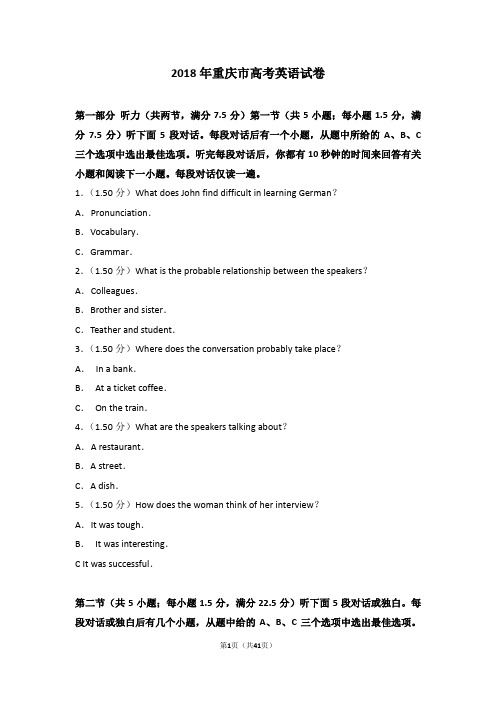
2018年重庆市高考英语试卷第一部分听力(共两节,满分7.5分)第一节(共5小题;每小题1.5分,满分7.5分)听下面5段对话。
每段对话后有一个小题,从题中所给的A、B、C 三个选项中选出最佳选项。
听完每段对话后,你都有10秒钟的时间来回答有关小题和阅读下一小题。
每段对话仅读一遍。
1.(1.50分)What does John find difficult in learning German?A.Pronunciation.B.Vocabulary.C.Grammar.2.(1.50分)What is the probable relationship between the speakers?A.Colleagues.B.Brother and sister.C.Teather and student.3.(1.50分)Where does the conversation probably take place?A.In a bank.B.At a ticket coffee.C.On the train.4.(1.50分)What are the speakers talking about?A.A restaurant.B.A street.C.A dish.5.(1.50分)How does the woman think of her interview?A.It was tough.B.It was interesting.C It was successful.第二节(共5小题;每小题1.5分,满分22.5分)听下面5段对话或独白。
每段对话或独白后有几个小题,从题中给的A、B、C三个选项中选出最佳选项。
听完每段对话或独白前,你将有时间阅读各个小题,每小题5秒钟;听完后,各小题将给出5秒钟的作答时间。
每段对话或独白读两遍。
6.(3.00分)听第6段材料,回答下列各题.(1)When will Judy go to a party?A.On Monday.B.On Tuesday.C.On Wednesday.(2)What will Max do next?A.Fly a kite.B.Read a magazine.C.Do his homework.7.(3.00分)听第7段材料,回答下列各题.(1)What does the man suggest doing at first?A.Going to a concert.B.Watching a movie.C.Playing a computer game.(2)What do the speakers decide to do?A.Visit Mike.B.Go boating.C.Talk a walk.8.(4.50分)听第8段材料,回答下列各题.(1)Which color do cats see better than humans?A.Red.B.Green.C.Blue.(2)Why do cats bring dead birds home?A.To eat them in a safe place.B.To show off their hunting skills.C.To make their owners happy.(3)How does the man sound at the end of the conversation?A.Grateful.B.Humorous.C.Curious.9.(6.00分)听第9段材料,回答下列各题.(1)Who is Macy?A.Ed's mother.B.Ed's teacher.C.Ed's friend.(2)How does Ed usually go to kindergarten?A.By car.B.On foot.C.By bus.(3)What does Ed enjoy doing at the kindergarten?A.Telling stories.B.Singing songs.C.Playing with others.(4)What do the teachers say about Ed?A.He's clever.B.He's quiet.C.He's brave.10.(6.00分)听第10段材料,回答下列各题.(1)At what age did Emily start learning ballet?A.Five.B.Six.C.Nine.(2)Why did Emily move to Toronto?A.To work for a dance school.B.To perform at a dance teacher.C.To learn contemporary dance.(3)Why did Emily quit dancing?A.She was too old to dance.B.She failed to get a scholarship.C.She lost interest in it.(4)How does Emily feel about stopping training?A.She's pleased.B.She's regretful.C.She's upset.第二部分阅读理解(共两节,满分30分)第一节(共4小题;每小题6分,满分30分)阅读下列短文,从每题所给的A、B、C和D四个选项中,选出最佳选项。
(完整)2018重庆高考英语试题Word真题试及答案
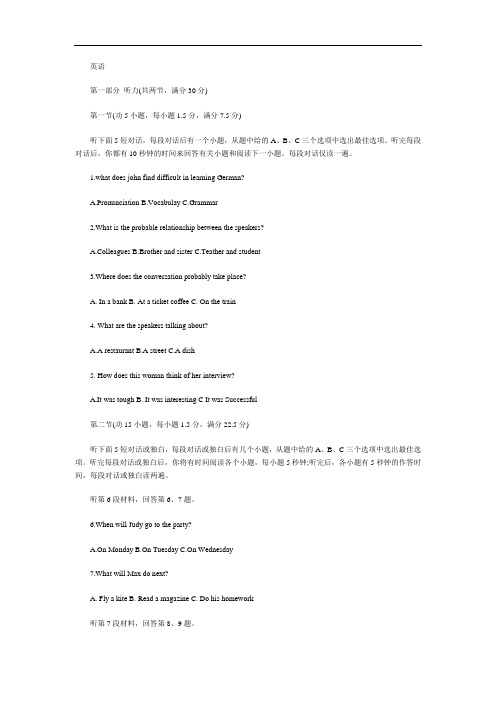
英语第一部分听力(共两节,满分30分)第一节(功5小题,每小题1.5分,满分7.5分)听下面5短对话,每段对话后有一个小题,从题中给的A、B、C三个选项中选出最佳选项。
听完每段对话后,你都有10秒钟的时间来回答有关小题和阅读下一小题。
每段对话仅读一遍。
1.what does john find difficult in learning German?A.PronunciationB.VocabulayC.Grammar2.What is the probable relationship between the speakers?A.ColleaguesB.Brother and sisterC.Teather and student3.Where does the conversation probably take place?A. In a bankB. At a ticket coffeeC. On the train4. What are the speakers talking about?A.A restaurantB.A streetC.A dish5. How does this woman think of her interview?A.It was toughB. It was interesting C It was Successful第二节(功15小题,每小题1.5分,满分22.5分)听下面5短对话或独白,每段对话或独白后有几个小题,从题中给的A、B、C三个选项中选出最佳选项。
听完每段对话或独白后,你将有时间阅读各个小题,每小题5秒钟;听完后,各小题有5秒钟的作答时间。
每段对话或独白读两遍。
听第6段材料,回答第6、7题。
6.When will Judy go to the party?A.On MondayB.On TuesdayC.On Wednesday7.What will Max do next?A. Fly a kiteB. Read a magazineC. Do his homework听第7段材料,回答第8、9题。
- 1、下载文档前请自行甄别文档内容的完整性,平台不提供额外的编辑、内容补充、找答案等附加服务。
- 2、"仅部分预览"的文档,不可在线预览部分如存在完整性等问题,可反馈申请退款(可完整预览的文档不适用该条件!)。
- 3、如文档侵犯您的权益,请联系客服反馈,我们会尽快为您处理(人工客服工作时间:9:00-18:30)。
2018年重庆市高考英语试卷第二部分阅读理解(共两节,满分30分)第一节(共4小题;每小题6分,满分30分)阅读下列短文,从每题所给的A、B、C和D四个选项中,选出最佳选项。
1. Summer ActivitiesStudents should read the list with their parents/carers, and select two activities they would like to do. Forms will be available in school and online for them to indicate their choices and return to school. Before choices are finalised, parents/carers will be asked to sign to confirm their child's choices.(1)Which activity will you choose if you want to go camping?________A.WBP.B.OUT.C. F.POT..D.CR(2)What will the students do on Tuesday with Mrs. Wilson?________A.See a parade and fireworks.B.Travel to London.C.Visit the WWI battlefields..D.Tour Central Paris.(3)How long does Potty about Potter last?________A.Four days.B.Two days.C.One week.D.Five days.2.Many of us love July because it's the month when nature's berries and stone fruits are in abundance. These colourful and sweet jewels form British Columbia's fields are little power houses of nutritional protection.Of the common berries, strawberries are highest in vitamin C, although, because of their seeds, raspberries contain a little more protein(蛋白质), iron and zinc(not that fruits have much protein). Blueberries are particularly high in antioxidants(抗氧化物质). The yellow and orange stone fruits such as peaches are high in the carotenoids we turn into vitamin A and which are antioxidants. As for cherries(樱桃), they are so delicious who cares? However, they are rich in vitamin C.When combined with berries of slices of other fruits, frozen bananas make an excellent base for thick, cooling fruit shakes and low fat "ice cream". For this purpose, select ripe bananas for freezing as they are much sweeter. Remove the skin and place them in plastic bags or containers and freeze. If you like, a squeeze of fresh lemon juice on the bananas will prevent them turning brown. Frozen bananas will last several weeks, depending on their ripeness and the temperature of the freezer.If you have a juicer you can simply feed in frozen bananas and some berries or sliced fruit. Out comes a "soft-serve" creamy dessert, to be eaten right away. This makes a fun activity for a children's party; they love feeding the fruit and frozen bananas into the top of the machine and watching the ice cream come out below.(1)What does the author seem to like about cherries?A.They are high in vitamin A.B.They contain protein.C.They are rich in antioxidants.D.They have a pleasant taste.(2)Why is fresh lemon juice used in freezing bananas?A.To keep their colour.B.To make them smell better.C.To improve their nutrition.D.To speed up their ripening.(3)What is "a juicer" in the last paragraph?A.A drink.B.A dessert.C.A machine.D.A container.(4)From which is the text probably taken?A.A health magazine.B.A biology textbook.C.A travel brochure.D.A research paper.3.Teens and younger children are reading a lot less for fun, according to a Common Sense Media report published Monday.While the decline over the past decade is steep for teen readers, some data in the report shows that reading remains a big part of many children's lives, and indicates how parents might help encourage more reading.According to the report's key findings, "the proportion(比例)who say they 'hardly ever' read for fun has gone from 8 percent of 13-year-olds and 9 percent of 17-year-olds in 1984 to 22 percent and 27 percent respectively today."The report data shows that pleasure reading levels for younger children, ages 2-8, remain largely the same. But the amount of time spent in reading each session has declined, from closer to an hour or more to closer to a half hour per session.When it comes to technology and reading, the report does little to counsel(建议)parents looking for data about the effect of e-readers and tablets on reading. It does point out that many parents still limit electronic reading, mainly due to concerns about increased screen time.The most hopeful data shared in the report shows clear evidence of parents serving as examples and important guides for their kids when it comes to reading. Data shows that kids and teens who do read frequently, compared to infrequent readers, have more books in the home, more books purchased for them, parents who read more often, and parents who set aside time for them to read.As the end of school approaches, and school vacation reading lists loom(逼近)ahead, parents might take this chance to step in and make their own summer reading list and plan a family trip to the library or bookstore.(1)What is the Common Sense Media report probably about?A.Quality of children's books.B.Children's reading habits.C.Parent-child relationships.D.Children's after-class activities.(2)Where can you find the data that best supports "children are reading a lot less for fun"?A.In paragraph 3.B.In paragraph 2.C.In paragraph 5.D.In paragraph 4.(3)Why do many parents limit electronic reading?A.It could be waste of time.B.E-books are of poor quality.C.E-readers are expensive.D.It may harm children's health.(4)How should parents encourage their children to read more? A.Ask them to write book reports.B.Act as role models for them.C.Talk with their reading class teachers.D.Set up reading groups for them.4.We've all been there: in a lift, in line at the bank or on an airplane, surrounded by people who are, like us, deeply focused on their smartphones or, worse, struggling with the uncomfortable silence.What's the problem? It's possible that we all have compromised conversational intelligence. It's more likely that none of us start a conversation because it's awkward and challenging, or we think it's annoying and unnecessary. But the next time you find yourself among strangers, consider that small talk is worth the trouble. Experts say it's an invaluable social practice that results in big benefits.Dismissing small talk as unimportant is easy, but we can't forget that deep relationships wouldn't even exist if it weren't for casual conversation. Small talk is the grease(润滑剂)for social communication, says Bernardo Carducci, director of the Shyness Research Institute at Indiana University Southeast. "Almost every great love story and each big business deal begins with small talk," he explains. "The key to successful small talk is learning how to connect with others, not just communicate with them."In a 2014 study, Elizabeth Dunn, associate professor of psychology at UBC, invited people on their way into a coffee shop. One group was asked to seek out an interaction(互动)with its waiter; the other, to speak only when necessary. The results showed that those who chatted with their server reported significantly higher positive feelings and a better coffee shop experience. "It's not that talking to the waiter is better than talking to your husband," says Dunn. "But interactions with peripheral(边缘的)members of our social network matter for our well-being also."Dunn believes that people who reach out to strangers feel a significantly greater sense of belonging, a bond with others. Carducci believes developing such a sense of belonging starts with small talk."Small talk is the basis of good manners," he says.(1)What phenomenon is described in the first paragraph?A.Inappropriate behaviours in public places.B.Addiction to smartphones.C.Impatience with slow service.D.Absence of communication between strangers.(2)What is important for successful small talk according to Carducci?A.Relating to other people.B.Showing good manners.C.Making business deals.D.Focusing on a topic.(3)What does the coffee-shop study suggest about small talk?A.It raises people's confidence.B.It improves family relationships.C.It makes people feel good.D.It matters as much as a formal talk.(4)What is the best title for the text?A.Ways of Making Small TalkB.Conversation CountsC.Uncomfortable SilenceD.Benefits of Small Talk第二节(共1小题;每小题10分,满分10分)根据短文内容,从短文后的选项中选出能填入空白处的最佳选项。
